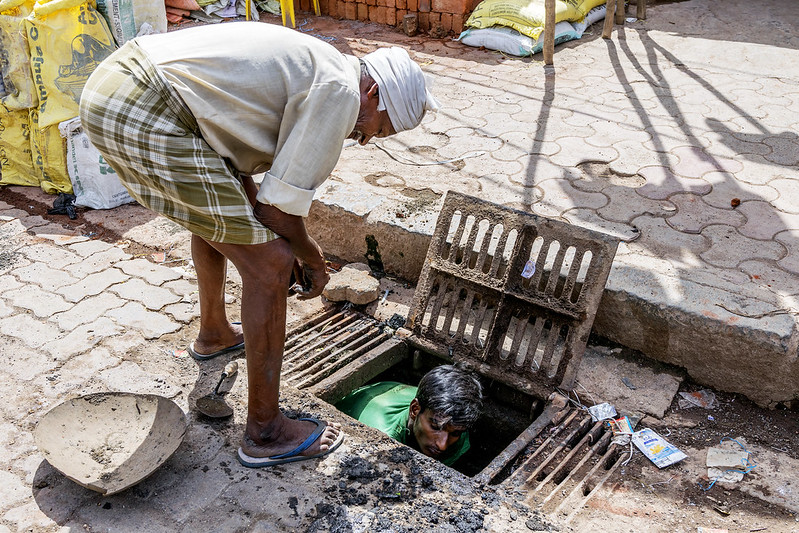More deaths among Faisalabad's 'sewer workers'
Asif Masih, 25, and Shan Masih, 28, inhaled toxic gases after falling into a clogged manhole. They left behind their wives and three children each. The tragedy that occurred on Sunday 17 March sheds light on this category of workers, unprotected and discriminated against.
Faisalabad (AsiaNews) - Two more deaths among Christian "sewer workers" in Pakistan shed light on the tragic and precarious conditions in which this category finds itself operating. Those who lost their lives two days ago were Asif Masih, 25, and Shan Masih, 28, residents of Maqbool Town, Ghulam Mohammadabad; they were cousins, leaving behind wives and three children each. Their passing was strongly condemned by workers' rights activists, who did not mince words, considering their deaths "murders" that occurred in the workplace, "out of duty".
The Masih cousins - the youngest in the service of Wasa (Water and Sanitation Agency), while the second of Fwmc (Faisalabad Waste Management Company) - worked on Sunday, a day of rest for the Christian community which in Pakistan suffers high degrees of persecution, without adequate tools capable of safeguarding their health.
The workers were forced to enter a clogged manhole (about 5 meters wide and 5 meters deep) belonging to the sewerage system, located outside a wedding hall in the Faisalabad district, Punjab province. Without adequate equipment - hygiene kit, gas mask - inhaling the toxic gases proved lethal, killing them instantly.
After the tragic event, no one between WASA, FWMS and Marquee (wedding hall) is taking responsibility for their deaths. WASA blames Marquee, saying they shouldn't have operated on Sunday. Marquee accuses the companies for which Asif and Shan Masih worked of not having guaranteed them the necessary safety, thus causing their deaths, as has already happened to other "sewer workers". As to why the two were operating on Sunday, Ilyas Masih, father of Asif Masih, responds.
“They were working privately to earn some money for their children, ahead of Easter. For Christmas they had not received their salary in time. They were thinking about new clothes and other things for their children,” he said. Families mourn those dedicated to economic subsistence. “How can we now celebrate the upcoming Easter, having lost two loved ones?”, he despairs.
Families who immediately received a visit from Khalil Tahir Sandhu, provincial minister of human rights, who assured "that the Punjab government will take care of the children of these two workers and that their educational expenses will be covered by the government".
If on the one hand the attention dedicated to this case by the authorities instills hope, on the other it represents a new push to denounce the inhuman conditions in which these workers still operate.
“Months ago, a supervisor ordered a 15-year-old Christian boy to clean the manhole: he also died due to the absence of the equipment kit" - says Abrar Younas, union leader. "Now, after this case, Mariam Nawaz, Prime Minister of Punjab, has taken note of the incident, but clear action is required."
Starting from the clear accusation against the supervisors of the "sewer workers" of carrying out "murders", and the ban on working privately, without protection.
Naveed Walter, president of HRFP (Human Right Focus Pakistan), an NGO active in the country since 1994, spoke about how the death of the Masih cousins speaks of the challenges that "sewer workers" face on a daily basis. “They are unrecognized, underpaid and represent one of the most marginalized segments of society,” he said.
He challenges that have increased exponentially in the last 15 years in Pakistan, including the city of Faisalabad. “90 percent of these workers belong to the Christian community (in the country there are approximately 4 Christians out of 233 million inhabitants, ed.).
This is the main reason why they suffer discrimination, are exploited and abused,” she continues. Hrfp has been committed to making things improve for years. In 2015 a petition was presented to the Lahore High Court, addressing the rights of these workers. The Court pushed the local administration to provide them with the necessary hygiene kits, but this request was met with nothing.
"Over the years, many have died, many have become disabled, others have faced various health-related complications,” continues Naveed Walter.
Situations that cause great hardship to their families, who are often not protected at all, without some protective measures , insurance or social security. Now the important thing is to act, to avoid other human tragedies of this nature. “Local authorities and the government should take immediate action to provide all the necessary resources and safety equipment,” he concludes.
23/08/2017 16:25







.png)










